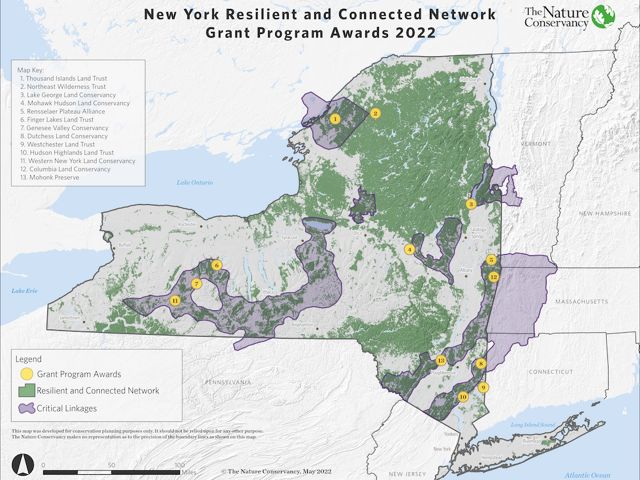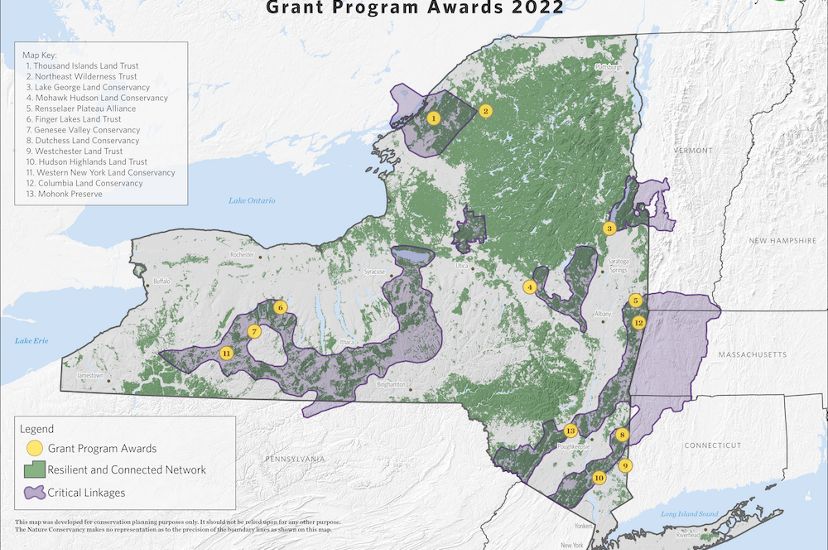13 Land Trusts Across New York Receive Grant Funding from The Nature Conservancy
Grants will increase the pace and scale of conserving places where nature can thrive in a changing climate
Media Contacts
-
Amanda Ely
The Nature Conservancy
Phone: 917-687-9982
Email: amanda.ely@tnc.org
The Nature Conservancy in New York is pleased to announce the recipients of the 2022 Resilient and Connected Network (RCN) Grant Program. A total of $325,000 was awarded to 13 land trusts across New York State. Now in its second year, the grant program engages land trust partners to increase the pace and scale of conserving places where plants and animals can thrive in a changing climate and promotes land protection in the critical linkages between the Central and Northern Appalachian regions.
Ground-breaking science led by Dr. Mark Anderson, director of The Nature Conservancy’s Center for Resilient Conservation Science identifies resilient and connected lands and waters across the United States that can provide plant and animal species refuge from droughts, floods, and other growing threats from climate change. This roadmap, which took more than ten years to develop, shows where nature can thrive.
To date, the RCN grant program has awarded $625,000 in flexible grants to partner land trusts resulting in 4,880 acres protected within this network identified by Dr. Anderson. The geographic focus of the grants awarded fall within priority linkage areas that are critical to making connections between core forests within New York and beyond our borders.
“The Nature Conservancy in New York’s Resilient and Connected Network Grant Program deepens our efforts to work with land trust partners to respond to the urgent climate threats we’re facing,” said Stuart F. Gruskin, chief conservation and external affairs officer, The Nature Conservancy in New York. “This is future-focused conservation. We’re co-investing with other land trusts and leveraging efforts to benefit people and nature as the climate continues to change.”
Protecting New York’s climate-resilient lands and waters will not only help sustain plants and animals across the state and beyond, it’s necessary for people, too. The water we drink, the air we breathe, and many aspects of community prosperity are dependent on healthy natural systems.
This year the project team included The Nature Conservancy in New York’s social scientists to add equity values in the program design, ensuring that the ways in which people and communities could benefit were considered. This included sustainable economic development, working with new or nontraditional partners, and projects that support vulnerable communities. The projects funded by the grant program all identified benefits provided by nature to people, and over two-thirds of applicants specified access, engagement with low-income communities and/or communities of color, or education as project outcomes.
The 2022 grant recipients are:
- Columbia Land Conservancy
- Dutchess Land Conservancy
- Finger Lakes Land Trust
- Genesee Valley Conservancy
- Hudson Highlands Land Trust
- Lake George Land Conservancy
- Mohawk Hudson Land Conservancy
- Mohonk Preserve
- Northeast Wilderness Trust
- Rensselaer Plateau Alliance
- Thousand Islands Land Trust
- Westchester Land Trust
- Western New York Land Conservancy
The Nature Conservancy is a global conservation organization dedicated to conserving the lands and waters on which all life depends. Guided by science, we create innovative, on-the-ground solutions to our world’s toughest challenges so that nature and people can thrive together. We are tackling climate change, conserving lands, waters and oceans at an unprecedented scale, providing food and water sustainably and helping make cities more sustainable. The Nature Conservancy is working to make a lasting difference around the world in 77 countries and territories (41 by direct conservation impact and 36 through partners) through a collaborative approach that engages local communities, governments, the private sector, and other partners. To learn more, visit nature.org or follow @nature_press on X.

